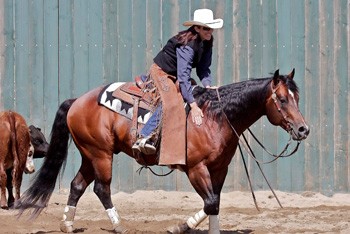Feeding
for Performance
About Our Feed
Integrity Feed
Dr. Bray's Corner
Feeding Advice
Where to Buy
Feeding for Performance

The type of exercise a horse gets determines the type of energy sources that it needs. For example, a pleasure horse ridden lightly 3 times a week may only need pasture or hay fed daily. On the other hand, a competitive endurance horse should be fed a balanced high fat, beet pulp formula to complement the forage portion of their diet.
Athletic performance requires a balance of fuel sources. The primary source should be volatile fatty acids from digesting forages, with the remaining sources needed for performance being a combination of fats, starch, and sugar.
Protein indirectly contributes less than 10-12% energy and should not be a primary fuel source. A couple of studies have suggested that high protein diets actually have an adverse effect on performance.
Quick Tips
1) The timing of feeding balanced formulas becomes more important with the increase of work intensity.
2) Forage should be fed approximately one hour before a balanced formula for horses with moderate, intense or heavy workloads.
3) Frequent meals will improve utilization of nutrients and energy. Balanced formulas, grains, grain mixes, or concentrates should not be more than 4 lbs. per meal for the average adult horse.
4) Carbohydrates or fat are always being used for performance but the one most used depends on the type, intensity and length of exercise.
- High-intensity, short-duration exercise (racing, reining, working cow, team penning) will depend more on glucose from dietary carbohydrates and glycogen stores.
- Low-intensity, long-distance work (endurance) will require more slow releasing energy of free fatty acids from fat and VFAs from forages.
5) Horses working at high-intensity, short-duration and not fed an adequate blend of carbohydrates will deplete their muscle glycogen and fatigue faster.
- Studies suggest that horses fed low non-structural carbohydrate diets have lower muscle glycogen stores and will not be completely replenished for 72 hours after exercise.
- Failure to fully replenish glycogen stores will result in early fatigue and poor performance.
- For exercises lasting longer than one hour, carbohydrates consumed before exercise will have a priming effect on muscle cell metabolism by serving as an immediate fuel source during initial phases of exercise. As exercise continues aerobically, slow release of fatty acids from fat digestion begins to kick-in.
6) Fat is not as flexible an energy source as starches/sugars because of the aerobic and anaerobic differences relative to energy utilization.
- A higher fat feed will complement the carbohydrates used as fuel because fat has a sparing effect on glycogen utilization.
- Fat has a positive influence with lowering blood glucose levels while carbohydrates have a positive influence on efficiency with fat utilization.
- High fat diets are more beneficial with a moderate to high carbohydrate intake. Therefore a performance horse will not be adequately fueled if a feed is high in fat and low in digestible carbohydrates.
7) Beet pulp and soy hulls are ideal for fueling performance because they have a slower release of glucose.
8) Oats are better-suited for performance than corn and barley because it elicits a higher blood glucose for a longer period of time.
Click here to see how much you should feed your horse based on their body weight.
